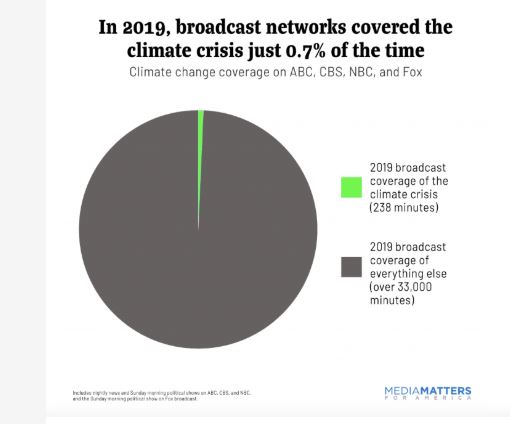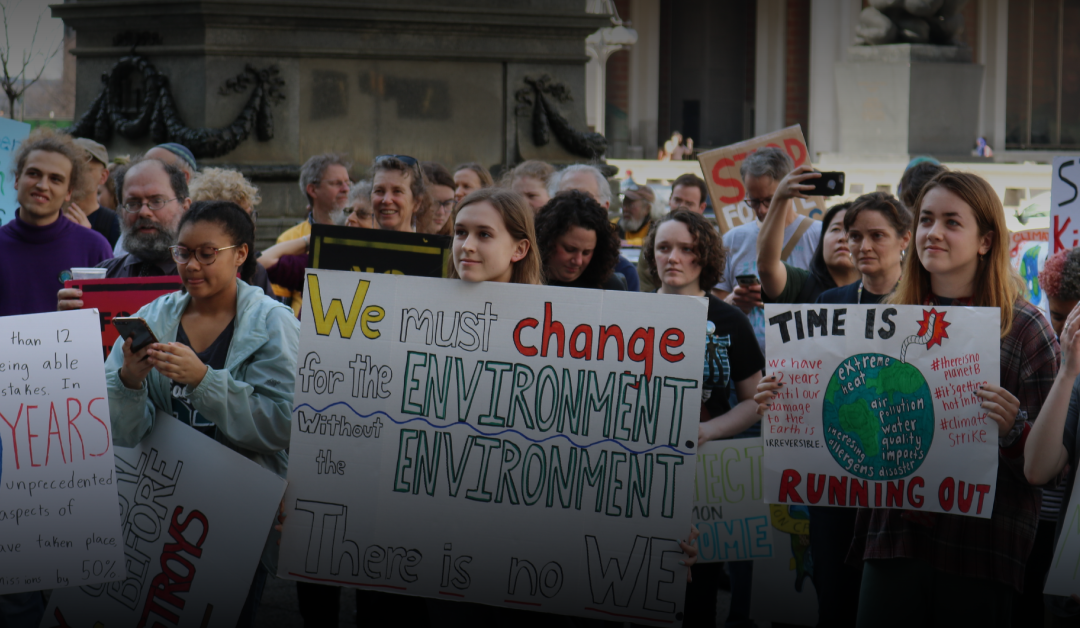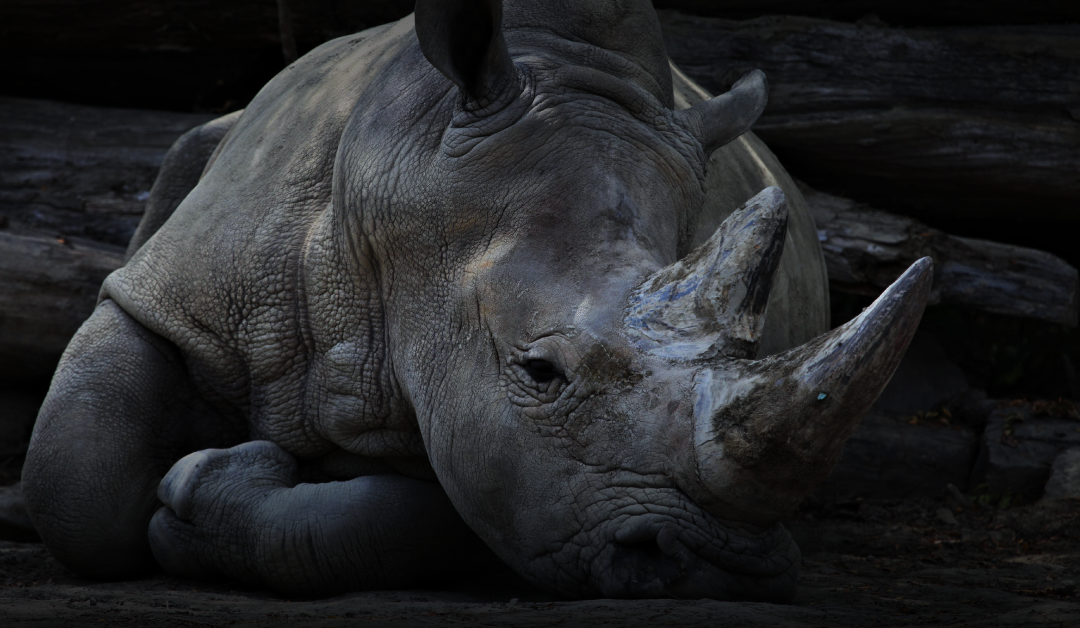
by Noah's Ark | Mar 17, 2020 | Climate Change, Global |
Short-term politics and human nature shape a bias to address
only what’s right in front of us
Because “outbreak” and “pandemic” and any of a dozen high-stakes words accompany dispatches about the deadly novel coronavirus, it’s not surprising, nor ill-advised, that the news media and financial markets respond with alarm to COVID-19. Still, the critical response leaves scientists, environmental advocates and long-view money managers imploring: Where’s the impetus for moving on policy change and market-driven fixes (solutions to store carbon, for instance) to limit a future environmental health crisis — one on par with or even greater than a coronavirus?
For one thing, the public may feel compelled to only respond to what’s in front of them.
“Americans are seeing coverage of the virus across multiple media platforms in a consistent manner, which is bringing awareness and driving public concern,” write Monica Medina and Miro Korenha of Our Daily Planet. “On the other hand, you’ve probably seen very little coverage that [the National Oceanic and Atmospheric Administration] predicts this year’s flooding in the Midwest could rival last year’s catastrophic floods that claimed lives and also helped spread disease to livestock and people.”
According to a recent study by the organization Media Matters, news shows on the major networks aired only 238 minutes of climate crisis coverage in 2019, which was actually up from 2018 significantly, but as a whole still made up only 0.7% of overall nightly broadcasts and the Sunday morning news shows.

It is true that climate change and its response appear in specialized media and occasionally crack the lineup of mainstream coverage. Investing giant BlackRock’s admission in recent months that climate change and sustainability would drive investment decision-making dominated financial outlets and cable television programming. Just this week, via the Associated Press, any interested reader could have learned that the “EU unveils a new climate law — Greta Thunberg calls it ‘surrender’”
“The nature of a risk matters greatly in how we react to it. Coronavirus can be considered a present threat over which there is a great deal of uncertainty about its scale and impact, [yet] there is a significant possibility that its long-term impact is negligible,” writes Joe Wiggins, a researcher in portfolio and fund management, who’s behind the Behavioural Investment blog.
The stock market SPX, -11.98% , for now, has priced in more than “negligible risk.”
But Wiggins stresses: “Contrastingly, climate change is predominantly a future threat, but there is a high level of confidence that its long-term impact without intervention will be catastrophic for humanity.”
According to the American Lung Association, about four in 10 Americans live in counties that have monitored unhealthy ozone and/or particle pollution. And respiratory ailments, including asthma, are only part of the rising risks that led at least one major medical journal to declare climate change the health issue of the century.
Politics is mostly a short game, which is at odds with a climate-change response.
“If [politicians] make the electorates’ life more difficult it reduces their chances of being re-elected; even if the imposition of discomfort now is designed to deliver incalculable benefit in the future,” he said. “As heretical as it may sound, there are valid questions to be raised about whether a democratic system with regular elections is suited to dealing with an issue that requires short-term sacrifice for long-term benefits.”
Surveys show that Americans do care, even if politicians need more convincing to respond. According to the Yale Program for Climate Change Communication, a record 69% of voting-age Americans say they are worried about climate change. Almost one third say they are “very worried,” the highest percentage ever recorded.
Professor Michael Livermore, an expert in cost-benefit analysis with the University of Virginia School of Law, said that media and politicians essentially respond to, and adjust their alarm to what the public demands. They more often follow than lead.
“We’re talking horse-race politics. Left. Right. The base. People do get passionate about climate change but it takes more effort and doesn’t immediately strike people,” he said. “And the extremes are apparent. The public either doesn’t care at all or declares it end times. The human mind finds it hard to find the middle.”
There is a clear link between a public health epidemic and climate change. Economic downturns, such as that linked to a coronavirus, tend to slow environmental impacts, including reducing emissions from industry and transportation. Therein lies a challenge, say environmental advocates: behavioral change and infrastructure investment, not worrisome headlines, are needed for lower emissions to become structural.
“As with the rare instances when worldwide carbon pollution dipped in the past, driven by earlier economic shocks, diseases, and wars, emissions are likely to rise again as soon as the economy bounces back,” said James Temple, the senior editor for energy, writing in the MIT Technology Review. “In the meantime, if the virus leads to a full-blown global pandemic and economic crash, it could easily drain money and political will from climate efforts.”
He listed other factors: restrictive capital markets could turn off the financing necessary for solar, wind and battery expansion at companies; China, initially hit by coronavirus, is a major hub for production of solar, wind and battery technologies; and cheaper oil could make electric vehicles a harder sell.
That said, a sustained drop in oil prices CL00, 4.181% could make longer-term investments in clean energy more attractive for major energy players, a Eurasia Group analyst told Axios.
Coronavirus and climate change are linked in other ways.
Officials may have to postpone or cancel the upcoming COP26 — the next United Nations gathering of top climate officials due to be held in Glasgow, Scotland, in November — as other major conferences around the world have been nixed due to contagion fears.
Perhaps one global crisis can inform the other.
Coronavirus is producing an enforced experiment in behavioral change, as increasing numbers work from home and reduce travel, environmentally friendly practices by most measure. Coronavirus response could also be a catalyst for structural investment as businesses review their resilience, say analysts.
“One possibility is that cultural change already under way, on the evidence of consumer trends such as flight shaming [finger-pointing at celebrities and others for swelling their carbon footprint via frequent travel] will be reinforced,” said Julie Hudson, a senior equity research analyst, focused on ESG and sustainability, for UBS, in a research note.
Original source: https://www.marketwatch.com

by Noah's Ark | Feb 6, 2020 | Global, Climate Action |
An Open Letter to Greta Thunberg:
You are not a moral leader. But I will tell you what you are.
Greta Thunberg:
You have declared yourself a leader and said that your generation will start a revolution.
You have comported yourself as a credentialed adult and climate change activist who has fearlessly addressed politicians and world leaders.
You have dropped out of school and declared that there isn’t any reason to attend or any reason for you to study since there will be no future for you to inherit.
You have, rather than attend your classes, been leading Friday Climate Strikes for all students in your generation across the globe.
Your attendance at oil pipelines has been striking. There, you unequivocally declare that all oil needs to remain in the ground where it belongs.
I shall, therefore, against the backdrop of your activism, address you as an adult rather than as a child.
In September of 2019, you crossed the Atlantic in a “zero-carbon” racing yacht that had no toilet and electric light on board. You made an impassioned plea at the United Nations in which you claimed that “we have stolen your dreams and our childhood with our empty words.”
You claimed that adults and world leaders come to young people for answers and explained in anger: “How dare you!”
You claimed that we are failing you and that young people are beginning to understand our betrayal. You further declared that if we continue to fail your generation: “We will never forgive you.”
You have stated that you want us to panic, and to act as if our homes are on fire. You insist that rich countries must reduce to zero emissions immediately.
In your speeches, you attack economic growth and have stated that our current climate crisis is caused by “buying and building things.”
You call for climate justice and equity, without addressing the worst polluter on the planet – China; the country that is economically annexing much of Africa and Latin America.
You dare not lecture Iran about its uranium projects — because that’s not part of the UN’s agenda, is it?
You proclaim that we need to live within the planetary boundaries, to focus on equity and “take a few steps back” for the sake of all living species.
You resent the hierarchical distinctions between humans and animals and entertain no qualitative distinction between a monkey, a malaria-infested mosquito and a snarling hyena.
You mouth slogans such as: “We have set in motion an irreversible chain reaction beyond control,” and you advocate for universal veganism on the Ellen DeGeneres show.
You do not buy new clothes, and you don’t want the rest of us to either. You want us all to stop flying in jet planes without giving us an alternative as to how we would re-transform our financial and trading systems—to say nothing of our personal enjoyment of the world—without regression to a primaeval era.
Few can afford to cross the Atlantic in a $6M zero-carbon yacht financed by rich people who made their wealth by the very means you condemn as loathsome.
There are a few things that we, the rational adults of the world who are not bowing to you like guilt-ridden obsequious Babbitts need to say to you, Greta.
First, we did not rob you of your childhood or of your dreams.
You are the legatee of a magnificent technological civilization, which my generation and the one before it and several others preceding it all the way to the Industrial Revolution and the Renaissance, bequeathed to you.
That growth-driven, capitalist technological civilization has created the conditions for you to harangue us over our betrayal. It is a civilization that eradicated diseases such as smallpox from the word, and that lifted millions out of abject poverty in a universe you think is dying and decaying. It assured you a life expectancy that exceeded that of your ancestors. Most likely by focusing on economic growth which you demonize, and scientific advancement, that civilization will further enhance a robust quality of life and health for your descendants.
Here is a hard truth to ponder, Greta: if the great producers of this world whom you excoriate were to withdraw their productivity, wealth and talents—in short—their minds from the world today, your generation would simply perish.
Why?
Because as children you have done nothing as yet, with your lives besides being born. This is what we expect of children until such time as they can be producers by learning from their elders. You are understandably social and ecological ballast. You are not yet cognitively advanced to replicate the structures of survival of which you are the beneficiaries.
Children are important instalments in the future. We have invested in you. It is you and your smug generation, which thinks they have nothing to learn from the older ones who are failing themselves. Whom do you expect to employ the majority of you if you have neither the job credentials or life competency skills to navigate the world? The future unemployable-skipping- school-on-Friday obstreperous children?
The truth, as one anonymous blogger aptly put it, is that your generation is unable to work up to forty hours per week without being chronically depressed and anxious.
Its members cannot even decide if they want to be a boy or a girl, or both, or neither, or a “they.”
They cannot eat meat without crying.
I might add that your generation needs “trigger warnings” and “safe spaces” as pre-conditions for learning in school.
Its members have a pathological need to be coddled and protected from the challenging realities of life.
Your generation is the biggest demander and consumer of carbon-spewing technological gadgets and devices. An hour without any of them and too many of you succumb to paralyzing lethargy.
Your generation is the least curious and most insular set of individuals one has ever encountered. Your hubris extends so far that you think you have nothing to learn from your elders.
Yes, we have betrayed you: by capitulating the world of leadership to bored, attention-deficit children who spout bromides, platitudes and slogans that a rudderless and morally relativistic culture accepts because a significant number of its denizens have become intellectually bankrupt and morally lazy.
The logical endpoint of your ecological vision would see us living in primaeval conditions eking out an existence in jungle swamps in which we would regard poisonous snakes and man-eating tigers as our moral equals.
We would have to adapt ourselves to nature rather than adapt nature to meet our needs, like all members of civilized civilizations do.
Your vision would see us foraging for mushrooms and plants without knowing which were inimical to our digestive systems. Under your system we would swelter from heat, die from rampant plagues and starvation because there will be no air-conditioning units, no sophisticated plumbing and irrigations and sewer systems, no anti-bacterial soap made from animal matter, no pesticides and chemicals to sanitize our food and drinking supplies: just one primordial swamp of human putrefaction.
If civilization is left in the hands of your ecofascist supporters we will be living in grass huts, drinking animal faeces infested water, and shrinking in fear from polar bears instead of killing them for food when they attack us.
Greta, living in complete harmony with nature is the death of creativity. Understand this. All great civilizations were forged in the crucibles of proper exploitation of the earth. Those who lived on the land with oil and did nothing with it never had a right to it in the first place.
Non-usage of God’s resources is the cardinal sin because it results in the un-development of our human capabilities, and makes us indistinguishable from beasts.
Your generation needs to be taught the morality of wealth creation, rather than only parasitically benefiting from it. The only revolution you will lead is one into nihilism and civilization regression.
You need to learn about the moral case for fossil fuel. You owe it to yourself to understand how as, Kathleen Hartnett White has detailed, the harnessing of the vast store of concentrated energy in fossil fuels allowed mankind, for the first time in human history, to escape intractable constraints and energy limits that had left all but the very privileged in total poverty and depravity. Before the Industrial Revolution, all societies were dependent on a very limited flow of solar energy captured in living plants for subsistence needs such as food, fuel and shelter.
But we, the creative enterprisers, will not go back to the Dark Ages.
Your philosophy can be summed up as follows:
What was good for my anthropoid ancestors is good for me. Do not rock the boat, or even build one as that will require cutting down a tree. Do not disrupt nature. Do not dare to see the earth as rightfully belonging to us. We don’t have the right to use our brains in a manner that can transform our needs into a material form. Let’s conveniently forget that production is the application of reason to the problems of survival. Let’s all diminish the grandeur of man and his luminous potential. Crush the Thomas Edisons of this world.
The apocalyptic world vision you hold has been a strip landing for those who have hated progress throughout history. Your apocalyptic predictions have been made for millennia, and, we’re still here.
We will still be here long after you’ve grown up and we have forgiven you for skipping classes, thereby lowering the intelligence quotient of an entire generation.
Jason D. Hill
Jason D. Hill is professor of philosophy at DePaul University in Chicago and a Shillman Journalism Fellow at the David Horowitz Freedom Center. His areas of specialization include ethics, social and political philosophy, American foreign policy and American politics. He is the author of several books, including “We Have Overcome: An Immigrant’s Letter to the American People” (Bombardier Books/Post Hill Press). Follow him on Twitter @JasonDhill6.

by Noah's Ark | Feb 5, 2020 | Global, Climate Change |
If the planet warmed by about 3° Celsius it would be disastrous with floods, farming breakdowns, killer heat.
2019 scientists noticed some of the climate simulation models started running very hot with some projections rising in excess of 5°C. The scientists running the simulations couldn’t agree on what was causing it or if they should be trusted but the they are working with real data so we can form our own judgements on this story.
Andrew Gettelman, a senior scientist at the National Center for Atmospheric Research in Boulder, Colorado, which builds a high-profile climate model, spoke of confusion within the group of scientists as they compared results from their individual tests.
“The question is whether they’ve overshot,” said Mark Zelinka, staff scientist at Lawrence Livermore National Laboratory.
Researchers are starting to put together answers on the recent Australian bush fires, a task that will take months maybe longer, and there’s not yet agreement on how to interpret the rising temperatures. The concern is these models have successfully projected global warming for a half century.
The simulations continue to frame all major scientific, policy and private-sector climate goals and debates, including the sixth encyclopedic assessment by the UN’s Intergovernmental Panel on Climate Change due out next year. If the same amount of climate pollution will bring faster warming than formerly assessed, humanity has less time to until the worst climate crisis activity starts manifesting on Earth.
The model run by NCAR, one of American’s foremost climate-science institutions, began producing unusual data in 2019 while trying to reproduce the recent past. “We got some really strange results,” Gettelman said.
The scientists went on to try 300 configurations of rain, pollution, and heat flows—something they can do as gods of their own digital earth—before matching the model to history. But by solving that puzzle, Gettelman’s team sent future projections upward at an unheard-of rate. NCAR found that CO₂ doubling would lead to 5.3°C world, a 33% jump from the model’s past reading on global warming.
Soon there were multiple teams at other institutions putting out new climate-sensitivity numbers that looked like worst-case scenarios on steroids. The Met Office Hadley Center, the U.K.’s main research group, found a doubling of CO₂ would deliver 5.5°C warming. A team at the U.S. Department of Energy ended up with 5.3°C, and the Canadian model topped out at 5.6°C. France’s National Center for Meteorological Research saw its estimate jump to 4.9°C from 3.3°C.

by Noah's Ark | Dec 11, 2019 | Global |
Did You Know There Are 17 Global Goals for A Better World?
In 2015, world leaders agreed to 17 goals for a better world by 2030. These goals have the power to end poverty, fight inequality and address the urgency of climate change. Guided by the goals, it is now up to all of us, governments, businesses, civil society and the general public to work together to build a better future for everyone.
Hein Prinsloo Curson, co-founder of The Noah’s Ark Foundation says “If the human race unites and works together there is no reason why we cannot achieve these 17 important goals. Division is our barrier”.
Richard Prinsloo Curson, co-founder of The Noah’s Ark Foundation says “We are all Noah and have a duty to live and work to our highest and best. We should question everything we do and try and make the right decisions. We should do our best to help people in need and make positive contributions to the 17 goals”.
The 17 Goals Are:
- No poverty
- Zero hunger
- Good health and wellbeing
- Quality education
- Gender equality
- Clean water and sanitation
- Affordable and clean energy
- Decent work and economic growth
- Industry innovation and infrastructure
- Reduced inequalities
- Sustainable cities and communities
- Responsible consumption and production
- Climate action
- Life below water
- Peace, justice and strong institutions
- Life on the land
- Partnerships for the goals

by Noah's Ark | Dec 4, 2019 | Global |
The Javan Rhino is the most endangered Rhino species with only 60 remaining in the wild. Poaching for the horn is the main cause of the decline. The species is forecast to be extinct within the next 5 years.
“Humanity is mis informed by the media and celebrity campaigns about the cause of Rhino extinction; Chinese trade, as poor African communities with no food, water or sanitation are resorting to poaching to earn money; the root cause of the problem. Poachers are supplying demand because it is a way of earning money to feed their families.” says Richard Prinsloo Curson, Co- Founder of The Noah’s Ark Foundation.
Not far behind is The Amur Leopard, one of the rarest felines in the world. Fast animals can run up to 35 miles which is faster than average UK road speed limits! They live between Russia and North Korea and fewer than 70 still live in the wild. They are being killed by poaching, human-induced forest fires, over-farming and loss of habitat. The fur is made into hats, gloves and coats.
Humans are to blame for only 200-300 African Gorillas surviving today. The species share between 95% and 99% of human DNA and is one of humanity’s closest relatives. Deforestation and hunting continue to shrink the Gorilla population which will be extinct within a matter of years unless more is done to protect them.
The Sumatran Tiger is one of the last remaining species of Tiger in the world and only 500 exist in the wild. It is native to South East Asia, India, China and some parts of Russia. They make dens in caves and hollow trees and hunt animals twice their size, they are also the only cat able to swim. The South China Tiger is already extinct in the wild and only a handful are bred in captivity. Tigers face extinction due to poaching, deforestation and loss of habitat.
Pangolin scales fetch $3,000 a kilo and are believed to have medicinal qualities. The Pangolin is natural to Africa, China, India and Malaya. It is one of the most endangered species in the world with one being taken from the wild every five minutes. The main cause of decline is poaching.
These animals represent 2000 endangered species on Earth today. The main cause of extinction is human poverty and greed. The solution is investment in communities which rely on deforestation, poaching and hunting to earn a living. Hein Prinsloo Curson of The Noah’s Ark Foundation says “Money is the reason the planet is dying. Humanity is stripping our world of its life to feed families and enrich themselves. Money is the solution to stopping this massive natural disaster. We need to invest into communities reliant on harming Earth so they no longer need to”.







